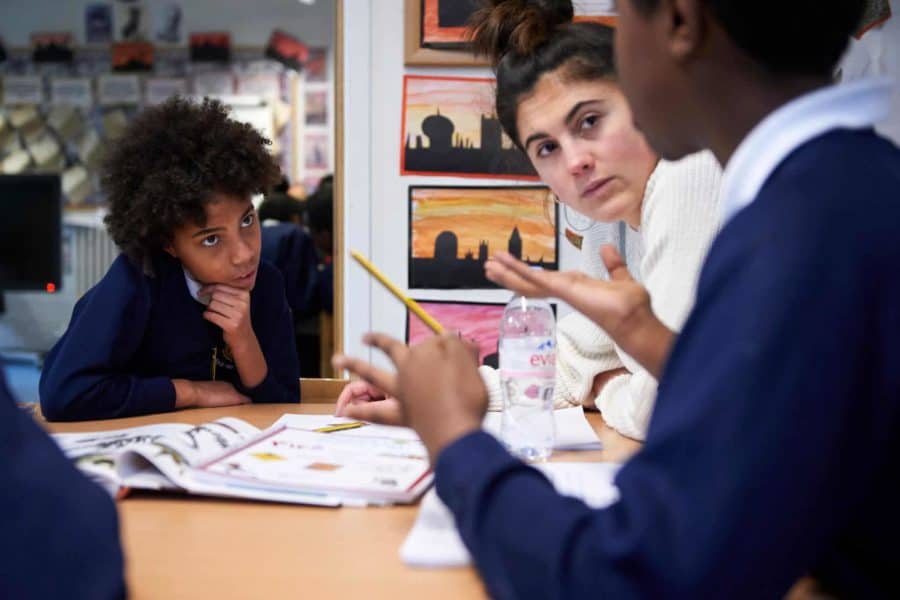Collective Sustainability – Quality education
This article is part of a series to explore how everyday citizens can support the Sustainable Development Goals (SDGs) locally through the power of collective action.
Education for my sister and all!
This article will be a bit more personal than all the others for one simple reason: if I needed to pick only one SDG to support for the rest of my life, education would be it. As they say, if you want to find your passion, you do not need to look for it, it is already there in one form or another. Probably my younger sister could tell you even more about this, accompanied with some rolling eyes, as she was the guinea pig of my early teaching attempts. It was obvious which books I was trying to use to teach her, their first few pages were full of writing and crinkles, the rest pristine, as eventually she always went on strike. I had to convince her again and again, “just one more class, it will be fun, I promise!”
Jumping forward in time eventually teaching did come back into my life, not as a full time career but, through an initiative I started with my friends to teach presentation skills to children. I absolutely loved teaching, it was the highlight of my week. As soon as I left the classroom I started thinking of new ideas to make sure the children understood the concepts and enjoyed the class at the same time. I currently work for an online education company, with which I can indirectly contribute to the lifelong learning of thousands of people around the world!
Getting back to the roots
When I moved to London I left our initiative behind. Despite my job in education, I did miss hands-on teaching. My favourite subject at school was maths. I truly enjoyed those extra exercises and brainteasers, so it was quite an obvious idea to give the love of maths to others (‘cringe-factor’ 10 out of 10!). After a quick Google search I stumbled upon Action Tutoring, which is one of the largest education charities offering volunteer tutoring opportunities in the UK. They specialise in helping pupils who are from disadvantaged backgrounds and struggle with English and maths, but could not afford to pay for extra support.
After my induction training I found myself standing sleepily at 8am at the gates of a primary school at King’s Cross, with ten other volunteers. Initially, I thought that the hard bit would be to make up the exercises and cover the whole curriculum. This is not the case though, as Action Tutoring provides a top-notch exercise book, with some really engaging exercises and games. The more challenging bit is motivating your pupils. I mean for one thing I am not a morning person, but imagine the enthusiasm the pupils have at 8am for two subjects they are struggling in. However, the mood always lifted by 9.30am and the pupils leaving with a smile on their faces.

Maths – not an all-time favourite?
Especially not fractions. I broke out in sweats several times, trying to find a way to explain the topic so that it finally clicked. First, you try to describe it as you remember it from when you were 11. You draw a big apple pie and ask them to colour the slices in, “You see, 1/4 is the same size as 2/8. Easy!” Blank looks. Right, so they don’t like apple pies, that must be the issue, let’s try with pizza. Same look, this time with eyes wandering to the window. Oh no, oh no, I am losing him! Do something! Am I explaining it wrong? No this can’t be, I tried the apple pie AND the pizza! Clearly, he is a lost cause, maybe we should just practise converting grams to kilograms. No, come on, one last time.
And then you hear an “Aaaaaaaahhh”, which usually comes with a smile. A word that is so genuine that no one can fake it and it means that you can finally relax and breathe. Your job done for the day. With one of my pupils I had to wait for this moment for several weeks, and in those sessions she was yawning more than the number of exercises we solved. And then one day, she turned to me and said: “You know what? I don’t hate maths anymore, I actually like it now!”
Education in numbers
Just as we have seen with health and wellbeing, social disadvantage plays an important role when it comes to education outcomes as well. Already at a young age it affects school attainment as, on average, disadvantaged children are four months behind at the age of five, nine months behind by age 11, and 18 months behind by 16 years of age in England1. Later on, the scissor does not get narrower, as in 2018 only 20% of 18 year olds from the most disadvantaged areas entered full time Higher Education, which is higher than ten years ago. This figure for the most advantageous areas was 47%2. This is why initiatives like Action Tutoring are key to help these young people to fall behind with their education.
How could you get involved?
Action Tutoring runs its programmes in school terms, and you can join them for any term during the school year. They work in over 80 schools in London and another seven cities around the UK. A full-time job is not an issue as you can tutor just before work, to start your day on a high note!



